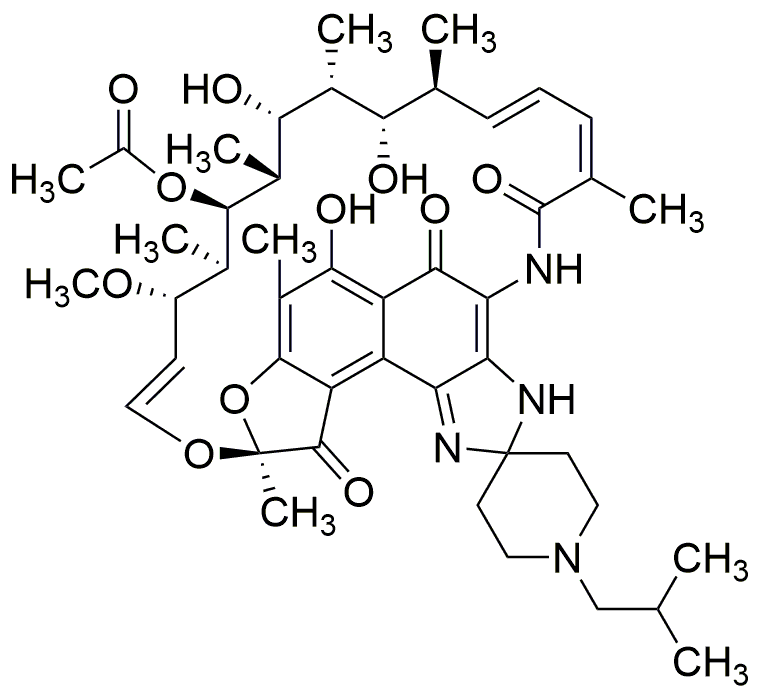Rifabutin is widely utilized in research focused on
- Treatment of Tuberculosis: Primarily used as an antibiotic to treat tuberculosis, especially in patients with HIV, enhancing patient outcomes and reducing the risk of drug resistance.
- HIV Co-infection Management: Effective in managing opportunistic infections in HIV-positive patients, providing a critical option for healthcare providers in improving overall patient health.
- Pharmaceutical Research: Employed in the development of new formulations and delivery methods, aiding researchers in creating more effective treatments with fewer side effects.
- Clinical Trials: Frequently used in clinical studies to evaluate its efficacy and safety, contributing to the advancement of medical knowledge and treatment protocols.
- Public Health Initiatives: Plays a role in global health programs aimed at controlling tuberculosis, particularly in high-burden countries, supporting efforts to reduce disease prevalence.
General Information
Properties
Safety and Regulations
Applications
Rifabutin is widely utilized in research focused on
- Treatment of Tuberculosis: Primarily used as an antibiotic to treat tuberculosis, especially in patients with HIV, enhancing patient outcomes and reducing the risk of drug resistance.
- HIV Co-infection Management: Effective in managing opportunistic infections in HIV-positive patients, providing a critical option for healthcare providers in improving overall patient health.
- Pharmaceutical Research: Employed in the development of new formulations and delivery methods, aiding researchers in creating more effective treatments with fewer side effects.
- Clinical Trials: Frequently used in clinical studies to evaluate its efficacy and safety, contributing to the advancement of medical knowledge and treatment protocols.
- Public Health Initiatives: Plays a role in global health programs aimed at controlling tuberculosis, particularly in high-burden countries, supporting efforts to reduce disease prevalence.
Documents
Safety Data Sheets (SDS)
The SDS provides comprehensive safety information on handling, storage, and disposal of the product.
Product Specification (PS)
The PS provides a comprehensive breakdown of the product’s properties, including chemical composition, physical state, purity, and storage requirements. It also details acceptable quality ranges and the product's intended applications.
Certificates of Analysis (COA)
Search for Certificates of Analysis (COA) by entering the products Lot Number. Lot and Batch Numbers can be found on a product’s label following the words ‘Lot’ or ‘Batch’.
Numéro de catalogue
Numéro de lot/série
Certificates Of Origin (COO)
This COO confirms the country where the product was manufactured, and also details the materials and components used in it and whether it is derived from natural, synthetic, or other specific sources. This certificate may be required for customs, trade, and regulatory compliance.
Numéro de catalogue
Numéro de lot/série
Safety Data Sheets (SDS)
The SDS provides comprehensive safety information on handling, storage, and disposal of the product.
DownloadProduct Specification (PS)
The PS provides a comprehensive breakdown of the product’s properties, including chemical composition, physical state, purity, and storage requirements. It also details acceptable quality ranges and the product's intended applications.
DownloadCertificates of Analysis (COA)
Search for Certificates of Analysis (COA) by entering the products Lot Number. Lot and Batch Numbers can be found on a product’s label following the words ‘Lot’ or ‘Batch’.
Numéro de catalogue
Numéro de lot/série
Certificates Of Origin (COO)
This COO confirms the country where the product was manufactured, and also details the materials and components used in it and whether it is derived from natural, synthetic, or other specific sources. This certificate may be required for customs, trade, and regulatory compliance.


